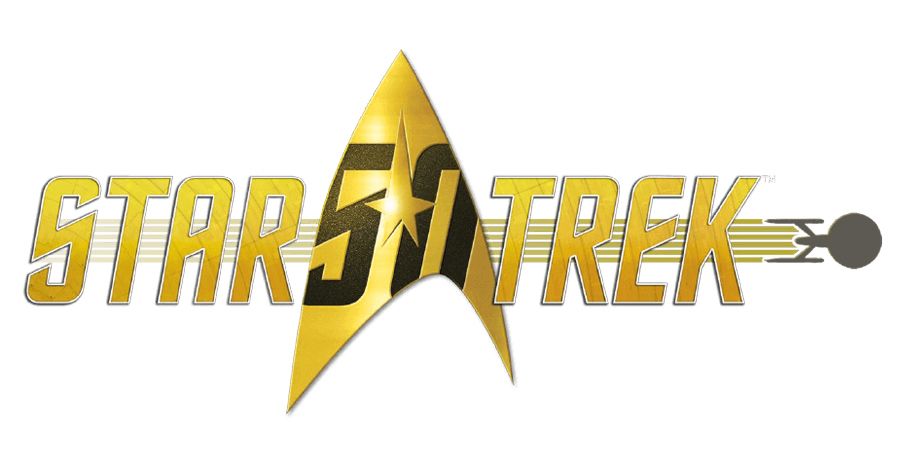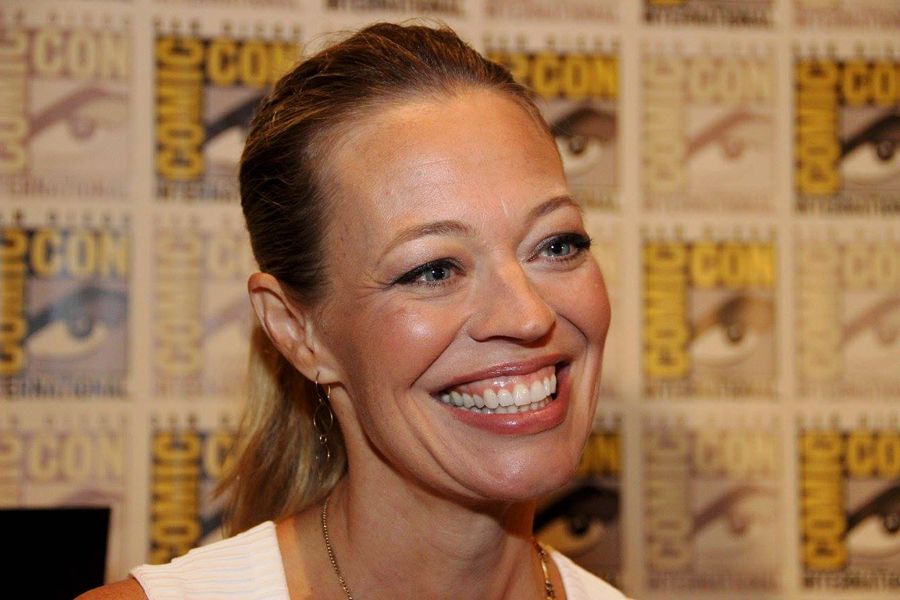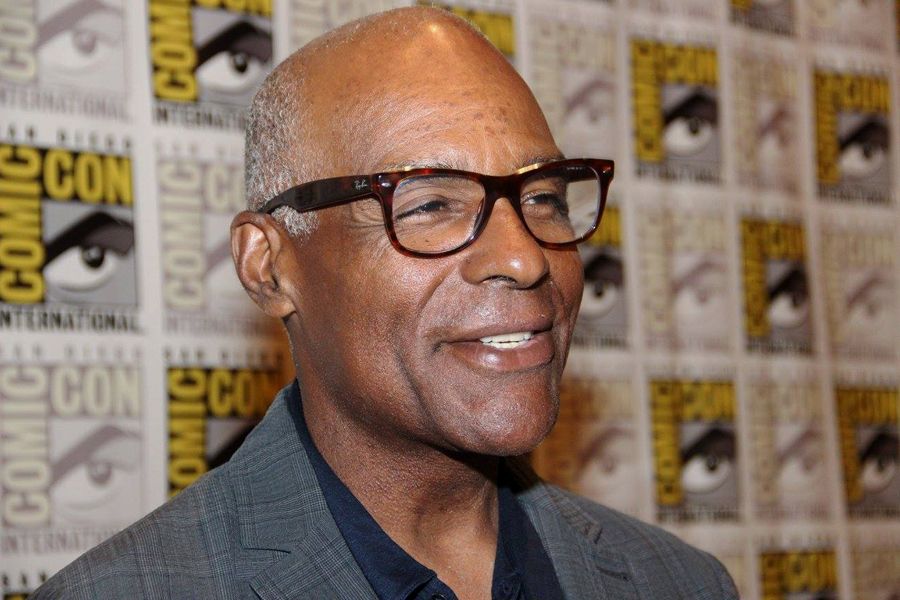After a half a century, the ability of “Star Trek” to inspire people to strive for a better future remains a remarkable pop culture phenomenon.
Few people understand the power of the franchise, and creator Gene Roddenberry’s vision, better than the performers and creators who have lived at the heart of the TV series and films.
Several of them gathered at Comic-Con International in San Diego to celebrate the 50th anniversary of the original series: William Shatner (“Star Trek”), Brent Spiner (“Star Trek: The Next Generation”), Michael Dorn (“The Next Generation,” “Star Trek: Deep Space Nine”), Jeri Ryan (“Star Trek: Voyager”) and Scott Bakula (“Star Trek: Enterprise”), as well as veteran franchise writer/producer Bryan Fuller, who’s spearheading the upcoming series “Star Trek: Discovery,” and fellow producers Heather Kadin and Rod Roddenberry, the son of Gene Roddenberry.
After a public panel, the actors gathered for a press conference in which they took note of how they’ve witnessed “Star Trek” inspire its fans to explore new frontiers, both figuratively and literally.
On the staggering cultural influence of “Star Trek’ over the past five decades:
William Shatner: I’m doing a show called “The Truth Is in the Stars,” and I’m going to be interviewing some of the most interesting people – I’m culminating with Stephen Hawking, so I’m getting to meet some of the most remarkable people that are alive today that are guiding our lives in a way with information and discovery, extraordinary people. There are things afoot that are affecting our lives completely. The line of this show is “How did ‘Star Trek’ affect you? What did ‘Star Trek’ do to you when you were 50 years younger? How did it affect you?” And all these people were affected by “Star Trek.”
RELATED: For "Star Trek's" 50th, Franchise Stars Look to the Future
It’s a television series. You can’t take it too seriously. It’s a lot of fiction, but at the same time, science fiction is mythology, and it tries to tackle those things that we can’t explain. … We’ve invented through science fiction a mythology, and “Star Trek” is a huge part of that. So many great science fiction writers had ideas for “Star Trek,” even if they didn’t write exactly for “Star Trek,” so it was 50 years as a mere television show, and through various iterations expanded to affect a great deal of our culture, far beyond anything we know.
I mean, I wrote a book called “I’m Working on That” based on Stephen Hawking’s statement, when he walked into the set of “Star Trek” and saw these cheesy boards painted to look like a, what’s the stuff we use for energy … dilithium crystals. That’s how we were able to go so fast to cover the vast distances of space. Stephen Hawking said, “I’m working on that.” It goes out in waves, and it seems somewhat innocuous, because it’s a television show, but in this case, this phenomenon has lasted 50 years.
Rod Roddenberry: I do have to say, when I look at “Star Trek,” I always look at the messages. The science fiction is great, and I do love that, but I do love how it’s inspired so many people. For me, being late to “Star Trek,” because I didn’t really appreciate it as a kid, the amount of people who will come up to me and share stories about how “Star Trek” inspires them, as Bill said, is just amazing that a TV show can do this.
Bryan Fuller: The state of this country right now terrifies me and saddens me. I feel like we need something like “Star Trek” to remind us that as a human race, we’re going to get our shit together, and we’re going to build a better future, and we have to start working on that today.
Scott Bakula: I’m astounded by anything surviving on television in any form for 50 years. Television has only been around for —
Shatner: 51.
Bakula: [Laughs] It’s mind-boggling, it really is. The show’s a collectiveness of conscience that has spread around the planet. It’s astounding.
Brent Spiner: “Star Trek” is the most amazing phenomenon. I think it’s the great American narrative. Because anything that has gone for 51 years you have to take seriously. There were a lot of people who think “Star Trek” is practically a religion. There are other people who think it’s absolutely silly. It’s somehow all of those things combined, and that’s what makes it wonderful.
Even if you think it’s completely ridiculous, you have to kind of say, “What is this that’s gone for 51 years? I’ve got to at least check it out.” There’s something going on here, and it’s affected a lot of people. We’ve all had people come to us and say, “It’s because of your show, it’s because of you, that I am now a doctor or a scientist or …” So there’s something more going on there than meets the eye. There’s a wonderful action-adventure show, but there’s also something deeper and more profound.
Jeri Ryan: What has been surprising is the number of people that have come up to me and said, “Because of ‘Star Trek’ my daughter is an engineer, my daughter is this, my son is this, I did this …” And it that’s incredible how it inspires people. … And I think for me, when I explored what could possibly be this captivating for so many people, is it’s so optimistic and hopeful. We need that so desperately, now more than ever. It’s about embracing everyone.
My God, this was the 1960s. This was not that long after World War II and they had a Japanese character on the bridge. This was in the height of the Cold War, and they’ve got a Russian on the bridge, they’ve got the blacks and the whites and the first interracial kiss. That was the whole message that Gene was putting out there, is inclusion and embracing everyone, and we’re all the same, and we’ve got to get back and realize that. It’s scary now. Everybody is terrified of everyone else who’s different, and it’s so frightening.
Michael Dorn: I always thought that “Star Trek,” Gene’s show, was great television, because in those days, there was a lot of great television. … Science fiction shows in those days were doing really stuff that was groundbreaking, because of the science fiction. And out of those shows, I think you could see that “Star Trek” was definitely leading the way. It really had this new voice that I think that we all were feeling in the 60s, which was, “It doesn’t have to be the way it was before. It doesn’t have to be the way it was with my parents. This is something new. It speaks to me.”
But if I had to pinpoint something, I would have to say that for every person that watches “Star Trek” that’s a big fan of the show, they have a different reason for loving it as much as they do. A person feels included that had felt left out, a person who feels hope for the future, a person who feels science, whatever it is. The number of reasons, it just isn’t one particular reason. So I mean, my original thought was that it was really great television – Gene knew how to do that – but the influence is mind-boggling.
On the reciprocal experience of the actors, having the opportunity to meet inspiring and influential people who’d been moved by “Star Trek,” including astronauts, scientists, innovators, world leaders and game-changers:
Dorn: Because I was a big airplane buff when I was growing up, and I loved airplanes and I loved test pilots and I loved my cereal boxes, the box tops with Friendship 7, John Glenn’s capsule, and it was a horrible model that I made. Those are the guys that I had a chance to meet that really kind of fueled my youth. That was amazing, because you’re talking about – they went to the moon! I mean, come on! Those are the guys that I just loved.
Bakula: I talked to a guy on the International Space Station with NASA. We sent up DVDs of our show, and he was watching it in space. We talked until Earth moved enough so we couldn’t talk anymore. We talked and talked and he said, “I’m going to lose you, sir.” He kept circling the planet. That was pretty cool. He made a video and sent it to us of them floating around up there and hanging out. It was combining all of it, it was completely surreal.
We met a lot of the astronauts, who would come to the set, and to actually speak to somebody who was doing it up there was just something you wouldn’t expect you’d ever get to do in your life.
Ryan: I met people who built a robot and sent a robot to Mars to communicate with it. It’s just amazing. It’s amazing the doors this has opened for us to get to meet people that are actually doing what we pretended to be doing on the show is really cool.
Shatner: For me, I love talking to people and finding the story and the character of who this person is and how they lived up to this point, and I’ve done shows in that way. This latest one that I’m doing, I’ve just come back from Vancouver, where I was talking to the great geneticist from Amherst College, Dr. David Suzuki.
It’s meeting people like Dr. Suzuki, astronaut Chris Hadfield, who I just interviewed a couple days ago at JPL – all of JPL subscribes to “Star Trek.” As does NASA. I’m doing a show for NASA, and all of NASA is enamored of “Star Trek.” I went to the doctor and he said, “I became a doctor because of ‘Star Trek.’ Now spread your legs.”
Spiner: I had the opportunity to meet Dr. Hawking because he did an episode of the show. We met all of the Mercury astronauts, they were all still with us, at the 30th anniversary of Alan Shepard’s first flight. It was overwhelming, and at that event was also Bob Hope and Walter Cronkite, and we were there, as pretend heroes.
But for me, the most rewarding experience has been meeting all of these people: all of the family of “Star Trek” that have been in all of these episodes and films. The great creative people that I’ve got to rub shoulders with has been amazing. It’s a huge family at this point.



